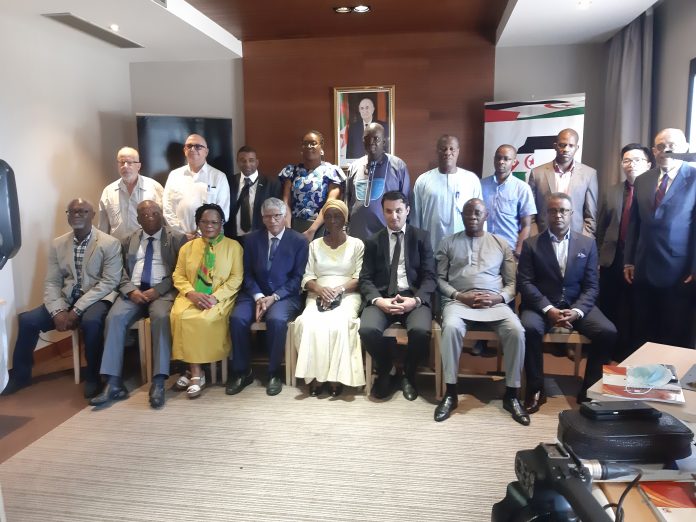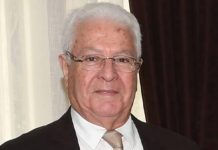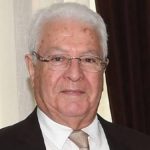ALGIERS-The participants in the Diplomatic Forum of Solidarity with the Sahrawi People affirmed, Friday, that the decolonization of Western Sahara is the responsibility of the United Nations (UN), stressing that the end of the current impasse requires real support from the Security Council to the UN envoy for Western Sahara, Staffan de Mistura.
At the end of the work of the 3rd edition of the Forum, which coincides with the 52nd anniversary of the Intifada of Zemla, the participants emphasized the need to implement the international decisions in this area and face the obstacles that hinder their implementation.
This forum was attended by ambassadors and representatives of embassies from African and Latin American countries, such as; South Africa (organizer of the event), Angola, Kenya , Vietnam, Venezuela, Ethiopia, Namibia, Zimbabwe, Ghana, Cuba and Mali, in addition to Algeria and the Algerian National Committee for Solidarity with the Saharawi People (CNASPS).
In their recommendations, the diplomats stressed the need to exert pressure to quickly reach a solution based on international legality, prevent the plundering, by the Moroccan occupation, of natural resources in the occupied Saharawi territories, respect the rights of Saharawis and release Sahrawi political detainees.
In this context, they called for extending the prerogatives of MINURSO to human rights, like other UN peacekeeping missions.
For his part, the Saharawi ambassador, Abdelkader Taleb Omar considered that the forum is an appreciable contribution in order to share with the Saharawi people the celebration of this anniversary and to reaffirm solidarity and support for their fight for the recovery of their legitimate rights to freedom and independence.
“It is also an opportunity to review the latest developments of the Sahrawi cause and exchange views on the actions to be taken in favor of this cause,” he maintained.
The Sahrawi diplomat considered that the escalation and the obstacles raised by the Makhzen, as well as the silence and the inaction of the United Nations are the main reasons for the resumption of the armed struggle and all the tensions that the region is experiencing, following the assassination of Saharawi civilians by drones, the tightening of the siege, the repression and the media blackout imposed in the occupied territories, in addition to the plundering of Saharawi resources and the obstruction of UN efforts.
In this wake, the Saharawi ambassador accused active parties within the UN Security Council of providing protection to the Moroccan occupier, stressing that the latter had not succeeded in bringing the conflict out of the framework and remains without legitimacy thanks to the struggle of the Sahrawis and the support given to their cause by the forces of liberation and justice, in particular in Africa and Latin America, as well as by the progressive forces in Europe.
Taleb Omar also referred to the position of the Spanish people and their political forces who reject, in their majority and in the strongest terms, the position of Spanish Prime Minister Pedro Sanchez, who has deviated from the consensual position adopted by the various parties since Spain’s withdrawal in favor of the right to self-determination of the Saharawi people within the framework of the United Nations, stressing that Sanchez isolated himself in his country, because of his positions, which are not recognized neither by the European Union nor the NATO .
For his part, the President of the Algerian National Committee of Solidarity with the Sahrawi People (CNASPS) and the representative of the International Movement of Solidarity with the Saharawi People, Dr. Said Ayachi, called for the implementation of the principles of the UN Charter and the principles set out in the Constitutive Act of the African Union, including respect for decolonization through a genuine process of self-determination under the auspices of the UN and the AU. He further urged for the implementation of the resolutions of the Peace and Security Council of the African Union (AU), adopted at its 984th meeting held on 9 March 2021.
In this aspect, the Algerian official added that UN efforts should “guarantee the sovereignty of the Saharawi people and their inalienable right to self-determination and independence, including the referendum agreed upon by the international community as stipulated in the UN resolution 1514 of December 14, 1960, while denouncing the massive and repeated violations of human rights in the Occupied Territories, the mistreatment of Saharawis political prisoners, the illegal plunder of the natural resources in Western Sahara by Morocco, the UN inertia in the implementation of Security Council resolutions in this area, as well as Morocco’s persistence in defiance of its international commitments and the precious efforts of the international community for peace in the region.
Hailing the magnificent diplomatic efforts deployed by several countries alongside the principled positions of the respective presidents, Mr. Ayachi shed light on the activities of the International Movement of Solidarity with the Saharawi People in Europe, Latin America and Africa with the aim to accompany the heroic Saharawis in their just fight for freedom and independence, two universally accepted values.
In a related context, the Head of CNASPS reiterated Algeria’s constant, unwavering and unconditional position in favor of the right of the Saharawi people to self-determination and independence, and the respect for human rights in the occupied Western Sahara, paying a vibrant tribute to the heroic Saharawis people and hailing the great legal victories gained by the Frente POLISARIO since its establishment on May 10, 1973, becoming the recognized representative and the vanguard of the Saharawi people.
The Algerian official launched an appeal to citizens of the world to mobilize in favour of the struggle of the Saharawi people until they choose their destiny through free, fair and democratic referendum, away from any pressure in accordance with the UN charter and doctrine on decolonization matters.
On another level, South Africa Embassy (organizer of the event) delivered, on May 12th, 2022, school supplies-related aids to the Saharawis at the Refugee Camps in Tindouf as part of South Africa’ solidarity efforts and contributions with a view to promoting access to education among the Saharawi children.
This People-to-People Solidarity Project with Western Sahara is the second of its kind following that undertaken in June 2021, aimed at providing educational support to the government of the Sahrawi Arab Democratic Republic.
Speaking to the media after being received by the Saharawi President of the Saharawi Republic, Ibrahim Ghali, the Chargé d’Affaires of the Embassy of South Africa in the Saharawi Republic, Seal Patrick Rankhumise, reiterated the firm and permanent position of his country in support of the Saharawi cause, stressing that South Africa will always accompany the Saharawi people and government in their struggle to recover their territory.
The beneficiaries of the project were the victims of Soweto elementary school situated in the province of Aousserd, located in the Sahrawi refugee camps in Tindouf. Noting that this educational establishment was named after a city in South Africa known for its resistence against the Apartheid system.
With regards the contributors to the consignment, Dr. SP Rankhumise emphasized that his embassy received overwhelming support from different embassies, namely; Kenya, Namibia, Tanzania, Vietnam, and Zimbabwe, along with the Algerian Committee on Solidarity with Saharawi People and Saharawi Resources Energy and Irrigation Company.
Interviewed by DZ Breaking, the Chargé d’Affaires of South Africa Embassy, Dr. SP Rankhumise stated that other initiatives will be organized by his country’s position in favor of the Saharawi people as the South African Development Committee has committed to provide support for the Saharawis.
“These initiatives are one of the many ways through which we operationalize solidarity with the people and government of Western Sahara,” he pointed out, noting that these actions of solidarity, initiated by South Africa, are out of love and stem from the principle of humanity.
As for the forum, the diplomat further explained that his country is diplomatically fully involved in the struggle. “I reiterate my country’ solidarity and firm support for the Saharawi people in their struggle for the exercise of their inalienable right to self-determination to pursue their economic, social and cultural development…South Africa calls for the acceleration of the decolonization process of Western Sahara in accordance with the Charter of the United Nations, the resolution 1514 (XV) of the United Nations General Assembly on the granting of Independence to colonial countries and peoples, as well as the resolutions of the African Union,” he stressed.
The South African official did not fail to hail Algeria’s leading role in favor of the Saharawi cause, pending the implementation of the historic resolution 1514 of the General Assembly, which establishes the right of colonized peoples to self-determination and independence. Algeria, noteworthy, will always remain peace patron at the regional and international levels. Algeria has always reiterated its keenness to continue to support the Saharawi people to realize their right to self-determination and independence.
“We are urging that concrete steps would be taken towards ensuring that the people of Western Sahara are afforded their deserved opportunity to determine their own destiny without neither delay nor hindrance. The Saharawi people have been patiently waiting for the long-promised referendum on self-determination,” he added.
The official wrapped up the interview by renewing his country’s unwavering and principled position in favor of the Saharawi people until they snatch their independence, and end the illegal occupation by the Kingdom of Morocco, while expressing gratitude for the government and people of Algeria for their constant support and solidarity with the Saharawi cause.
South Africa, noteworthy, has maintained a principled position on the right to self-determination for the Saharawi people as enshrined in the United Nations (UN) Charter and the African Union (AU) Constitutive Act. It also intensified its solidarity with the Polisario Front liberation movement, as they lead the people of Western Sahara in their quest for peace and independence.
In a related context, the Deputy Permanent Representative of South Africa, Ambassador Mabhongo considered, in his statement to the UN during the United Nations substantive Session of the Special Committee on Decolonization (C-24) 76th Session of the UN General Assembly, held on Monday 13 June in New York, that “Morocco’s autonomy plan is a unilateral plan without any recognition in international law”, adding that “any recognition of Western Sahara as part of Morocco is tantamount to recognizing illegal occupation and a flagrant violation of international law.”
The South African representative further called on the UN Special Committee on Decolonisation to send a visiting Mission to Western Sahara with a view to assessing the situation on the ground and assuming its responsibility in the protection of the rights of the defenseless Saharawi people.
South Africa, he added, “reaffirms her unwavering support for the inalienable right of the people of Western Sahara to exercise their right to self-determination and independence in accordance with the principles set forth in the United Nations Charter and the objectives of General Assembly resolution 1514 (XV) and other relevant resolutions and the ICJ Advisory legal opinion as well as related AU Decisions.”
Following is the full statement of the South African Representative:
Statement by Ambassador Xolisa Mabhongo, Deputy Permanent Representative of South Africa to the United Nations during the meeting of the Special Committee on Decolonisation (C-24), Agenda Item “Western Sahara”, 13 June 2022, New York.
“Chairperson,
My delegation wishes to thank you for your able leadership of this Committee. We thank you for keeping the decolonization agenda of the United Nations on track amidst the geopolitical challenges confronting the world today.
Chairperson,
The year 2023 will mark sixty-years since Western Sahara was placed on the United Nations list of Non-Self-Governing Territories as an agenda item. The UN General Assembly resolutions have been calling for the enabling of the people of Western Sahara to exercise their inalienable right to self-determination in accordance with relevant General Assembly and Security Council resolutions. However, almost six decades later, a full measure of self-government for the people of Western Sahara has not been attained.
It is further disconcerting that thirty-one-years after the Security Council mandated through its resolution, 690 (1991), the holding of a referendum on self-determination, it is yet to be realised and thus depriving the people of Western Sahara of their fundamental freedoms and human rights. As Member States we cannot continue to witness the perpetual denial through this august body, of the self-determination of the people of Western Sahara without concrete steps being taken towards a lasting, peaceful, and mutually acceptable solution.
Chairperson,
South Africa reaffirms her support for the inalienable right of the people of Western Sahara and their right to self-determination and independence in accordance with the principles set forth in the United Nations Charter and the objectives of General Assembly resolution 1514 (XV) and other relevant resolutions and the ICJ Advisory legal opinion as well as related AU Decisions. In this regard, we wish to reiterate the following recommendations:
We call on the Special Committee on Decolonisation to assume fully and effectively its responsibility towards the people of Western Sahara. This entails ensuring the protection of the political, economic, social, and cultural rights of the Sahrawi people, including their right to permanent sovereignty over their natural resources, and regular reporting to relevant UN bodies on the situation in the Territory.
South Africa urges the Special Committee on Decolonisation to send a visiting mission to Western Sahara to obtain first-hand information on the general situation in the Territory. It is regrettable that the only visiting mission of the Committee to the Territory of Western Sahara was undertaken in 1975. In the same breadth, the UN Security Council should also give due consideration to a Council visit to the occupied territories.
We have noted the Personal Envoy of the Secretary General to Western Sahara, Mr. Staffan de Mistura’s visits to the capitals of the US, France and Britain as part of his mediation efforts, and urge him to also visit the territories as a matter of priority.
We urge the Special Committee on Decolonisation to actively support the efforts of the African Union and the UN Personal Envoy of the Secretary-General for Western Sahara, Mr. de Mistura to relaunch the peace process in Western Sahara through direct and substantive negotiations between the Frente POLISARIO and the Kingdom of Morocco, and underscore that the ultimate objective of such negotiations is to enable the Saharawi people to exercise freely and democratically their inalienable right to self-determination and independence.
Let us be clear, Morocco’s autonomy plan is a unilateral plan without any recognition in international law.
In conclusion, South Africa believes that any recognition of Western Sahara as part of Morocco is tantamount to recognizing illegal occupation and it has been established that such recognition is a contravention of international law.
I thank you.”




























